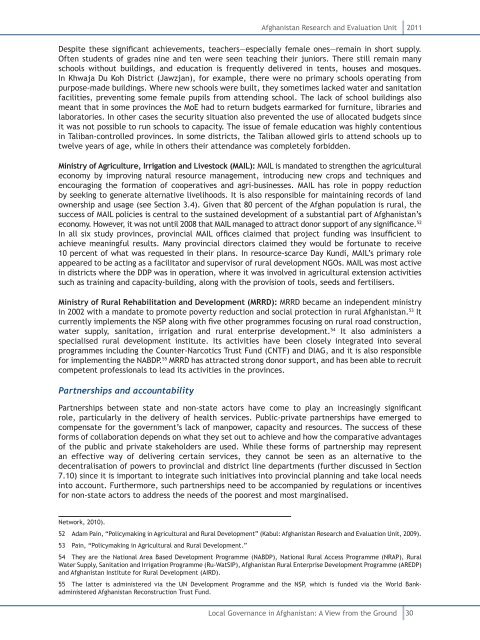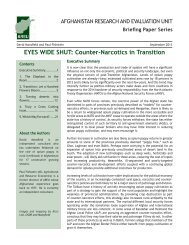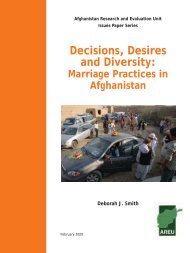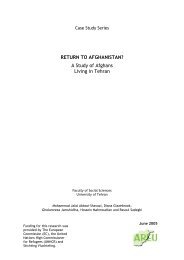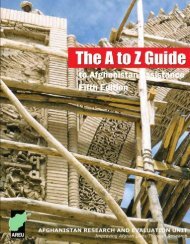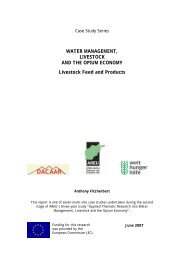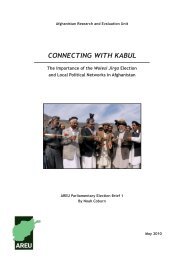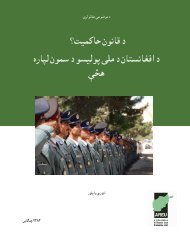Local Governance in Afghanistan: A View from the Ground
Local Governance in Afghanistan: A View from the Ground
Local Governance in Afghanistan: A View from the Ground
- No tags were found...
You also want an ePaper? Increase the reach of your titles
YUMPU automatically turns print PDFs into web optimized ePapers that Google loves.
<strong>Afghanistan</strong> Research and Evaluation Unit<br />
2011<br />
Despite <strong>the</strong>se significant achievements, teachers—especially female ones—rema<strong>in</strong> <strong>in</strong> short supply.<br />
Often students of grades n<strong>in</strong>e and ten were seen teach<strong>in</strong>g <strong>the</strong>ir juniors. There still rema<strong>in</strong> many<br />
schools without build<strong>in</strong>gs, and education is frequently delivered <strong>in</strong> tents, houses and mosques.<br />
In Khwaja Du Koh District (Jawzjan), for example, <strong>the</strong>re were no primary schools operat<strong>in</strong>g <strong>from</strong><br />
purpose-made build<strong>in</strong>gs. Where new schools were built, <strong>the</strong>y sometimes lacked water and sanitation<br />
facilities, prevent<strong>in</strong>g some female pupils <strong>from</strong> attend<strong>in</strong>g school. The lack of school build<strong>in</strong>gs also<br />
meant that <strong>in</strong> some prov<strong>in</strong>ces <strong>the</strong> MoE had to return budgets earmarked for furniture, libraries and<br />
laboratories. In o<strong>the</strong>r cases <strong>the</strong> security situation also prevented <strong>the</strong> use of allocated budgets s<strong>in</strong>ce<br />
it was not possible to run schools to capacity. The issue of female education was highly contentious<br />
<strong>in</strong> Taliban-controlled prov<strong>in</strong>ces. In some districts, <strong>the</strong> Taliban allowed girls to attend schools up to<br />
twelve years of age, while <strong>in</strong> o<strong>the</strong>rs <strong>the</strong>ir attendance was completely forbidden.<br />
M<strong>in</strong>istry of Agriculture, Irrigation and Livestock (MAIL): MAIL is mandated to streng<strong>the</strong>n <strong>the</strong> agricultural<br />
economy by improv<strong>in</strong>g natural resource management, <strong>in</strong>troduc<strong>in</strong>g new crops and techniques and<br />
encourag<strong>in</strong>g <strong>the</strong> formation of cooperatives and agri-bus<strong>in</strong>esses. MAIL has role <strong>in</strong> poppy reduction<br />
by seek<strong>in</strong>g to generate alternative livelihoods. It is also responsible for ma<strong>in</strong>ta<strong>in</strong><strong>in</strong>g records of land<br />
ownership and usage (see Section 3.4). Given that 80 percent of <strong>the</strong> Afghan population is rural, <strong>the</strong><br />
success of MAIL policies is central to <strong>the</strong> susta<strong>in</strong>ed development of a substantial part of <strong>Afghanistan</strong>’s<br />
economy. However, it was not until 2008 that MAIL managed to attract donor support of any significance. 52<br />
In all six study prov<strong>in</strong>ces, prov<strong>in</strong>cial MAIL offices claimed that project fund<strong>in</strong>g was <strong>in</strong>sufficient to<br />
achieve mean<strong>in</strong>gful results. Many prov<strong>in</strong>cial directors claimed <strong>the</strong>y would be fortunate to receive<br />
10 percent of what was requested <strong>in</strong> <strong>the</strong>ir plans. In resource-scarce Day Kundi, MAIL’s primary role<br />
appeared to be act<strong>in</strong>g as a facilitator and supervisor of rural development NGOs. MAIL was most active<br />
<strong>in</strong> districts where <strong>the</strong> DDP was <strong>in</strong> operation, where it was <strong>in</strong>volved <strong>in</strong> agricultural extension activities<br />
such as tra<strong>in</strong><strong>in</strong>g and capacity-build<strong>in</strong>g, along with <strong>the</strong> provision of tools, seeds and fertilisers.<br />
M<strong>in</strong>istry of Rural Rehabilitation and Development (MRRD): MRRD became an <strong>in</strong>dependent m<strong>in</strong>istry<br />
<strong>in</strong> 2002 with a mandate to promote poverty reduction and social protection <strong>in</strong> rural <strong>Afghanistan</strong>. 53 It<br />
currently implements <strong>the</strong> NSP along with five o<strong>the</strong>r programmes focus<strong>in</strong>g on rural road construction,<br />
water supply, sanitation, irrigation and rural enterprise development. 54 It also adm<strong>in</strong>isters a<br />
specialised rural development <strong>in</strong>stitute. Its activities have been closely <strong>in</strong>tegrated <strong>in</strong>to several<br />
programmes <strong>in</strong>clud<strong>in</strong>g <strong>the</strong> Counter-Narcotics Trust Fund (CNTF) and DIAG, and it is also responsible<br />
for implement<strong>in</strong>g <strong>the</strong> NABDP. 55 MRRD has attracted strong donor support, and has been able to recruit<br />
competent professionals to lead its activities <strong>in</strong> <strong>the</strong> prov<strong>in</strong>ces.<br />
Partnerships and accountability<br />
Partnerships between state and non-state actors have come to play an <strong>in</strong>creas<strong>in</strong>gly significant<br />
role, particularly <strong>in</strong> <strong>the</strong> delivery of health services. Public-private partnerships have emerged to<br />
compensate for <strong>the</strong> government’s lack of manpower, capacity and resources. The success of <strong>the</strong>se<br />
forms of collaboration depends on what <strong>the</strong>y set out to achieve and how <strong>the</strong> comparative advantages<br />
of <strong>the</strong> public and private stakeholders are used. While <strong>the</strong>se forms of partnership may represent<br />
an effective way of deliver<strong>in</strong>g certa<strong>in</strong> services, <strong>the</strong>y cannot be seen as an alternative to <strong>the</strong><br />
decentralisation of powers to prov<strong>in</strong>cial and district l<strong>in</strong>e departments (fur<strong>the</strong>r discussed <strong>in</strong> Section<br />
7.10) s<strong>in</strong>ce it is important to <strong>in</strong>tegrate such <strong>in</strong>itiatives <strong>in</strong>to prov<strong>in</strong>cial plann<strong>in</strong>g and take local needs<br />
<strong>in</strong>to account. Fur<strong>the</strong>rmore, such partnerships need to be accompanied by regulations or <strong>in</strong>centives<br />
for non-state actors to address <strong>the</strong> needs of <strong>the</strong> poorest and most marg<strong>in</strong>alised.<br />
Network, 2010).<br />
52 Adam Pa<strong>in</strong>, “Policymak<strong>in</strong>g <strong>in</strong> Agricultural and Rural Development” (Kabul: <strong>Afghanistan</strong> Research and Evaluation Unit, 2009).<br />
53 Pa<strong>in</strong>, “Policymak<strong>in</strong>g <strong>in</strong> Agricultural and Rural Development.”<br />
54 They are <strong>the</strong> National Area Based Development Programme (NABDP), National Rural Access Programme (NRAP), Rural<br />
Water Supply, Sanitation and Irrigation Programme (Ru-WatSIP), <strong>Afghanistan</strong> Rural Enterprise Development Programme (AREDP)<br />
and <strong>Afghanistan</strong> Institute for Rural Development (AIRD).<br />
55 The latter is adm<strong>in</strong>istered via <strong>the</strong> UN Development Programme and <strong>the</strong> NSP, which is funded via <strong>the</strong> World Bankadm<strong>in</strong>istered<br />
<strong>Afghanistan</strong> Reconstruction Trust Fund.<br />
<strong>Local</strong> <strong>Governance</strong> <strong>in</strong> <strong>Afghanistan</strong>: A <strong>View</strong> <strong>from</strong> <strong>the</strong> <strong>Ground</strong><br />
30


